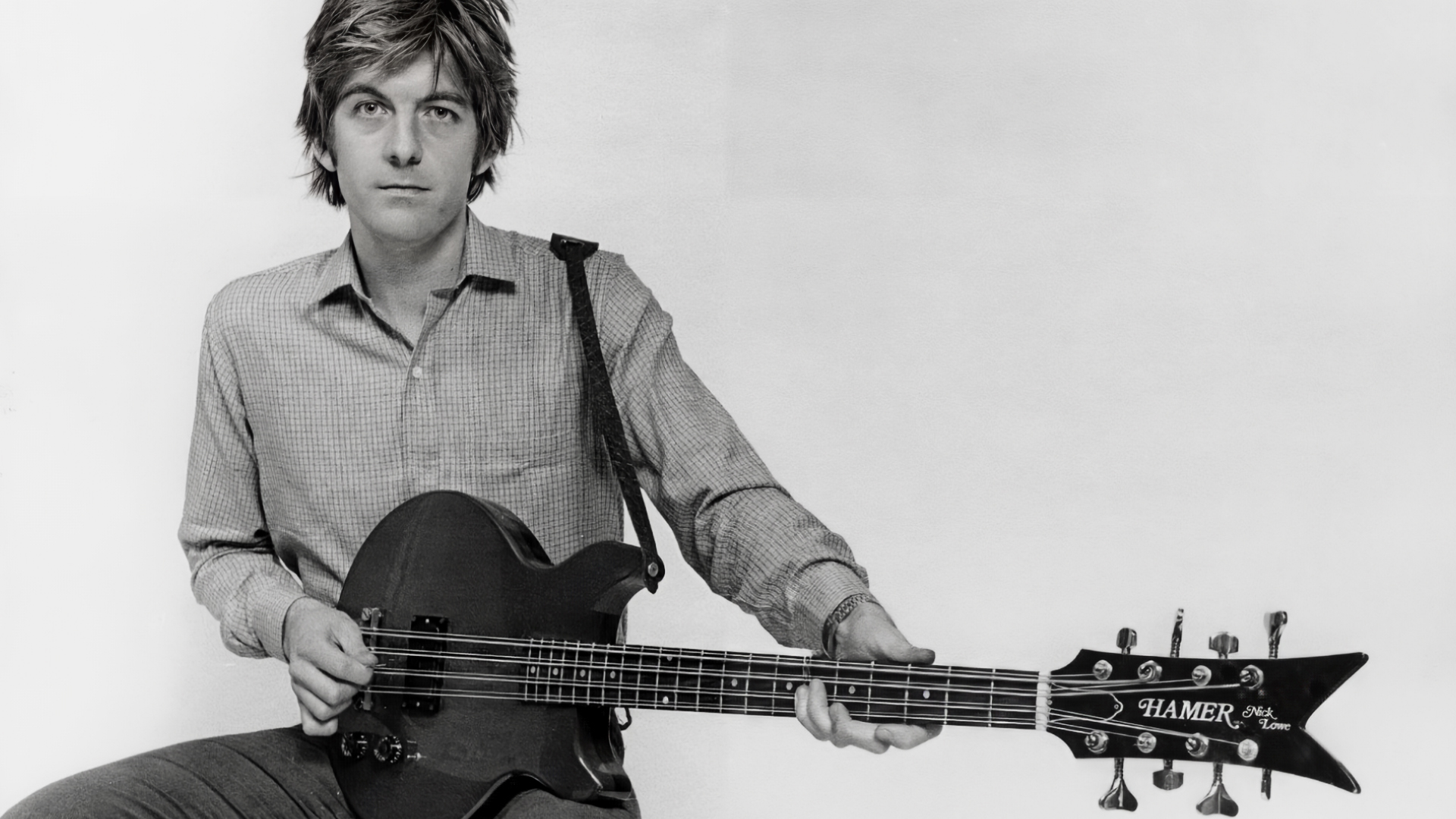“I wrote two songs that should have gone into the dustbin. They turned out to be my biggest hits.” The guitarist behind a pair of classic-rock gems says he’s just a strummer who thinks of himself as a jingle writer
Nick Lowe tells the story behind "Cruel to Be Kind" and four other career-defining tracks

"It's flattering of you to describe me as a guitar player," Nick Lowe says with a chuckle via Zoom from his home in England. "I've been just a strummer for a long time."
That strumming as served him well, of course — to the tune of 15 albums of his own, and membership in the bands Brinsley Schwarz, Rockpile and Little Village. Along the way he’s produced eight albums for Elvis Costello and helmed efforts by the Damned, Graham Parker, Dr. Feelgood, the Fabulous Thunderbirds, John Hiatt, and his ex-wife Carlene Carter, plus individual songs for Johnny Cash and the Pretenders.
Lowe is also a songwriter's songwriter, a craftsman celebrated for his originality, ingenuity and melodic sensibility. Look no further than his folk-rock song “(What’s So Funny ‘Bout) Peace, Love & Understanding,” which Costello revved up into one of the hardest-rocking tunes in his catalog (produced by Lowe, no less). The song went on to earn him even greater notice — and financial rewards — when Curtis Stigers covered it for the 1992 soundtrack to the Whitney Houston–Kevin Costner film The Bodyguard, the first album with verified sales of more than one million in a single week. Lowe is the complete package whether he's writing, producing, holding a guitar or, almost as often, a bass.
"I started off in the skiffle days, playing a little four-string sort of ukulele thing," Lowe recalls. "And then my mom taught me a few chords on the guitar when I was quite young. We used to sing together. She wasn't trained but she was pretty good, and I remember thinking it was some kind of magic when two voices singing together produce a kind of third sound. That really knocked me out and fascinated me."
Although Lowe eventually began playing bass as well as electric and acoustic guitar, he soon found that all roads led to songwriting, and he claims to still be a student of that pursuit. "I always think of myself as a Tin Pan Alley jingle guy, really — a Brill Building sort of guy," he acknowledges. "I make artistic decisions when I write songs, but really I'm looking for people to cover them. I prefer other people doing my songs than me doing them, really.
"The arty-farty thing really came later on, when suddenly it's like, 'Oh, this pop thing, it’s both arty and farty.' I never thought like that when I was a kid."
"I always think of myself as a Tin Pan Alley jingle guy — a Brill Building sort of guy. I prefer other people doing my songs than me doing them."
— Nick Lowe
That said, Lowe has perfectly happy to be recording his songs when he's working with Los Straitjackets. He joined forces with the masked surf-rock troupe on tour to promote his 2013 holiday album, Quality Street: A Seasonal Selection for All the Family, followed by a pair of subsequent EPs. The association has continued on this year's Indoor Safari, Lowe's first full-length album in 11 years, which combines those EP tracks with some new songs — including the group co-written opening track, "Went to a Party."
All the latest guitar news, interviews, lessons, reviews, deals and more, direct to your inbox!
"They're definitely my kind of musicians," Lowe explains. "They make what they do seem really simple, but what they do is very, very nuanced and skillful. They were my backing group, so to speak, for only about 10 minutes. After that we realized we created a third entity that's us, and we do quite a lot of songs now which didn't exist when we first got together because they're songs I wrote with this in mind."
With Lowe and Los Straitjackets hitting the road again this fall, however, we took the opportunity to have him tell the stories behind five songs he says define his now 50-year career.
“(What's So Funny 'Bout) Peace, Love & Understanding"
“I always think of ‘Peace, Love & Understanding’ as the first sort of original idea I had. I realized pretty quickly after I got into the music business that if I wanted to have any kind of longevity I had to learn to write songs. The way see it is everybody starts by rewriting their heroes' songs, and it's very obvious and quite easy to detect. It's not really stealing; you have to start somewhere. So like everybody else, that's what I did. Then one day when you're rewriting your sixth hero's catalog, you put a little bit of hero number one into a song you're writing, and two bits of hero number three, and suddenly it doesn't sound as much like anybody else. And it suddenly becomes your thing.
“I remember quite clearly, I woke up one morning and had this idea for a song called ‘(What's So Funny 'Bout) Peace, Love & Understanding.’ I thought, 'That's a real mouthful. It doesn't exactly trip off the tongue, but it is actually an original idea." I couldn't believe that I'd actually made up something that no one else had done before. And I had this sophisticated thought, which was, ‘Don't mess this up. Don’t overwrite this thing. Let the title work for you. Keep the verse very simple; you've got a good tune there, don't overdo it.’ That was a really sophisticated songwriting idea to have.
“The funny thing is, it seems like a song that I know, but I didn't really have anything to do with it. I've heard so many covers of that song. The one I really like is the one the Holmes Brothers did; I like their version of it. But I've got versions of it by a bunch of Tahitian fisherman singing it on a beach somewhere… all kinds. And that's fantastic. I'm always really pleased when people do it, and mildly surprised. When I wrote it I had no idea it would have any kind of legacy. I just wanted a hit and thought this could be a hit song. Those were the terms I thought in back then.”
"So It Goes"
“I had a brief job tour-managing for Graham Parker & the Rumour. I produced their first album, Howlin' Wind — in fact, that was the first album I produced — and their manager Dave Robinson had also managed Brinsley Schwarz for awhile, and Brinsley himself was in Graham's group. They were going on tour with Thin Lizzy, who were enjoying some sort of surge of success at the time, and Robinson asked me if I would tour-manage them.
“I remember Thin Lizzy's ‘The Boys are Back in Town’ playing all the time on that tour. It had this little descending thing that just got under my skin and I started singing ‘and so it goes, so it goes, so it goes’ while I was walking around doing my tour manager duties. The song isn't really about much. It's a bunch of interesting words strung together.
“I was talking about ‘the kid’ who cut off his right arm, and a 50,000-watt stack. The ‘kid’ was [Thin Lizzy guitarist] Brian Robertson — that was his nickname. He was quite a rock star. He was a good lad, actually, but he'd occasionally throw rock-starry tantrums. I wouldn't have liked to be at the receiving end of one of them, but he was always great fun to watch, and as a spectator sport it was quite interesting.”
"American Squirm"
“That one came from the night I was with Elvis, the night he played on Saturday Night Live and changed the song he was gonna do right in the middle of doing another. [Costello switched from “Less Than Zero,” a song with a U.K.-centric theme, to “Radio Radio,” which hadn’t even been released yet]. He'd been rehearsing all day. When they came to do the live show, he decided to do another song, which completely threw everyone into this panic, which of course Mr. Costello and his cohort — which I was part of — thought was an extremely amusing thing to do. It didn't make us very popular, but we thought the Saturday Night Live people were a bit smug. We said, ‘Well, they're always going on about it being live. Deal with this!’ Elvis just thought, Let's throw a bit of a hand grenade into it and do a different song. And it had exactly the effect that was required.
“So I went back to the hotel and thought up ‘American Squirm.’ I supposed it was harmless, really. It was a good pop tune; there was nothing vindictive or cruel. It is of its time. It seems to me Americans loved that song, but no one ever really noticed it over here in the U.K.”
"Cruel to Be Kind"
“When Brinsley Schwarz was going, we were a very hard-working group. We did a lot of shows, especially when the pub-rock scene started in London. We played a lot of roots music, country songs, R&B... But one of the things we liked at the time was disco music. We loved that stuff, even though in that scene they thought it was a bit weird when we started playing a song by the O'Jays or something like that. One of the tunes we really liked was called ‘The Love I Lost,’ by Harold Melvin & the Blue Notes. We tried to record it, but we couldn't do it justice. So I said, 'Okay, I’m gonna try to write a song like that,' 'cause it had a really fantastic, driving groove that would come in very handy for our shows. So I started trying to write a song like ‘The Love I Lost.’
“When the Brinsleys broke up, there's two songs that should've gone in the dustbin of history along with our other repertoire: ‘Peace, Love & Understanding’ and ‘Cruel to be Kind.’ ‘Cruel to Be Kind’ was pulled out by the great Gregg Geller, who signed me and Elvis to Columbia in the 70s. I handed over all the demos and all the unreleased stuff I had, and Gregg said, ‘I think this is a hit song.’ And I was like, ‘I don't think so, man. I've moved on. I've got a song about a dead movie star being eaten by a dog [the comically morbid ‘Marie Prevost’].’ He said, ‘I like that song, but I’m telling you, “Cruel to Be Kind” could be a hit.’ He kept on and on and on at me about that.
“I was in Rockpile at this time. We only made one album, but we made lots of records together. Labour of Lust was a Rockpile record, really. And I went to them one day and said, ‘Look boys, I'm really sorry about this but I've got this creaky old song like Harold Melvin & the Blue Notes and I'm getting leaned on to do this. Would you mind just giving me a hand with it?’ They didn't seem to mind nearly as much as I did. We had quite a lot of fun doing it, and I turned it in to Gregg. And lo and behold, he wasn't wrong.”
"Ragin' Eyes"
“It's a song that, when I recorded it, I didn't quite know what I had. It came along in the 1980s, when I was starting to lose my way a bit, for various reasons. I think it could’ve been more popular at the time if I'd been able to grasp what I had there, but it's a great little tune.
“I think I thought it was some sort of Cajun song or something like that. It couldn't make up its mind whether it needed to be played on a washboard or with a massive, like, ‘80s drum sound, so it wound up not being as effective as it would be if I recorded it now.
“Now, I'm much better at just taking the song idea at face value and letting it present itself. I wouldn't think, ‘Oh, this is a Cajun thing’ or ‘This is a pre-Beatles R&B thing’ and force it into that bag, whether it wanted to go there or not. I’m much better at letting them sort of breathe now. It's much better if you just let the song tell you want it wants to do and not be too hidebound about forcing it into some sort of rule-lined box.
“And that happened all the time. I hear songs from those days when I was in such a hurry. I seemed to write songs all the time, and I came up with good ideas, but I sort of sabotaged them very often by trying to rush to finish them. I've learned that all you've got to do is calm down and listen to the way it goes in your head and tease it out, instead of, ‘Oh, I know how this goes’ and slap two bad verses on the end. And some people love the two ugly verses I slapped onto the end of a song in 1975, but when I listen to them I think, ‘Nah, if only you'd taken your time about that and not think you could rush this along.’ I do that with Los Straitjackets from time to time, much better, to be honest. We've actually stopped doing it of late 'cause we're doing a whole lot of the newer songs. But we do a great version of ‘Ragin' Eyes.’ ”
Gary Graff is an award-winning Detroit-based music journalist and author who writes for a variety of print, online and broadcast outlets. He has written and collaborated on books about Alice Cooper, Neil Young, Bob Seger, Bruce Springsteen and Rock 'n' Roll Myths. He's also the founding editor of the award-winning MusicHound Essential Album Guide series and of the new 501 Essential Albums series. Graff is also a co-founder and co-producer of the annual Detroit Music Awards.


